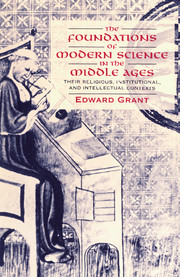 The Foundations of Modern Science in the Middle Ages
The Foundations of Modern Science in the Middle Ages Book contents
- Frontmatter
- Contents
- Preface
- 1 THE ROMAN EMPIRE AND THE FIRST SIX CENTURIES OF CHRISTIANITY
- 2 THE NEW BEGINNING: THE AGE OF TRANSLATION IN THE TWELFTH AND THIRTEENTH CENTURIES
- 3 THE MEDIEVAL UNIVERSITY
- 4 WHAT THE MIDDLE AGES INHERITED FROM ARISTOTLE
- 5 THE RECEPTION AND IMPACT OF ARISTOTELIAN LEARNING AND THE REACTION OF THE CHURCH AND ITS THEOLOGIANS
- 6 WHAT THE MIDDLE AGES DID WITH ITS ARISTOTELIAN LEGACY
- 7 MEDIEVAL NATURAL PHILOSOPHY, ARISTOTELIANS, AND ARISTOTELIANISM
- 8 HOW THE FOUNDATIONS OF EARLY MODERN SCIENCE WERE LAID IN THE MIDDLE AGES
- Notes
- Bibliography
- Index
5 - THE RECEPTION AND IMPACT OF ARISTOTELIAN LEARNING AND THE REACTION OF THE CHURCH AND ITS THEOLOGIANS
Published online by Cambridge University Press: 05 June 2012
- Frontmatter
- Contents
- Preface
- 1 THE ROMAN EMPIRE AND THE FIRST SIX CENTURIES OF CHRISTIANITY
- 2 THE NEW BEGINNING: THE AGE OF TRANSLATION IN THE TWELFTH AND THIRTEENTH CENTURIES
- 3 THE MEDIEVAL UNIVERSITY
- 4 WHAT THE MIDDLE AGES INHERITED FROM ARISTOTLE
- 5 THE RECEPTION AND IMPACT OF ARISTOTELIAN LEARNING AND THE REACTION OF THE CHURCH AND ITS THEOLOGIANS
- 6 WHAT THE MIDDLE AGES DID WITH ITS ARISTOTELIAN LEGACY
- 7 MEDIEVAL NATURAL PHILOSOPHY, ARISTOTELIANS, AND ARISTOTELIANISM
- 8 HOW THE FOUNDATIONS OF EARLY MODERN SCIENCE WERE LAID IN THE MIDDLE AGES
- Notes
- Bibliography
- Index
Summary
Major points of conflict existed between Church doctrine and ideas espoused in the natural books of Aristotle. The introduction of Aristotle's works into Latin Christendom in the thirteenth century was potentially problematic for the Church and its theologians. Although a clash was hardly inevitable, it was not long in coming. It seems to have hit hardest at the University of Paris, which not only had the greatest theological school of the Latin Middle Ages but also had one of the best and largest arts faculties. And yet, the conflict that developed must never be allowed to obscure the most important fact: that the translated works of Aristotle were enthusiastically welcomed and highly regarded by both arts masters and theologians. Indeed, Aristotle's philosophy was so warmly received that try as they might, the forces arrayed against it could not prevail.
THE CONDEMNATION OF 1277
The struggle against Aristotle was concentrated in the University of Paris and its environs. In 1210, soon after Aristotle's works in natural philosophy had become available in Latin, the provincial synod of Sens decreed that the books of Aristotle on natural philosophy and all commentaries thereon were not to be read at Paris in public or secret, under penalty of excommunication. Confined to the locale of Paris, this ban was repeated in 1215, specifically for the University of Paris.
- Type
- Chapter
- Information
- The Foundations of Modern Science in the Middle AgesTheir Religious, Institutional and Intellectual Contexts, pp. 70 - 85Publisher: Cambridge University PressPrint publication year: 1996


